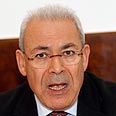
Syrian opposition head offers to resign
Just days after his re-election, Burhan Ghalioun says ready to step down amid mounting criticism of his leadership
Syria's main opposition council is crumbling under the weight of infighting and divisions over issues that cut to the heart of the revolution, including accusations that the movement is becoming as autocratic as the regime it wants to drive out.
The slow disintegration of the Syrian National Council, which has become the international face of the uprising, could complicate Western efforts to bolster the opposition, just as President Bashar Assad's regime gathers momentum in its crackdown on dissent.
Related stories:
- Assad threatens foreign leaders
- 'Israeli prison 5-star hotel compared to Syria jail'
- 'Gulf states funding Syrian rebels'
On Thursday, SNC leader Burhan Ghalioun said he was ready to step down once a replacement is found.
The decision came just days after he was re-elected for a third, three month term during a council vote held in Rome. The council has said it would rotate the presidency every three months, so Ghalioun's repeated appointments rankled some who wanted a new face.
"I will not accept under any circumstances to be a divisive candidate, and I am not after any post," said Ghalioun, an exiled Syrian and professor at the Sorbonne in Paris. "I will resign as soon as a new candidate is picked, either by consensus or new elections."
Ghalioun, a secular Sunni Muslim academic who has led the council since its formation in September, has been criticized by some opposition figures of being too close to the Muslim Brotherhood and of trying to monopolize power.
Fifteen months into the uprising, Syria's opposition is still struggling to overcome internal rivalries and power struggles that prevent the movement from gaining the traction it needs to present a credible alternative to Assad. Its international backers have repeatedly appealed for the movement to pull together and work as one unit.
But as the conflict becomes more violent, with rebel fighters and others taking up arms, attempts to operate under a single umbrella have become increasingly difficult.
Some opposition figures accuse the SNC leadership of being out of touch with reality on the ground. Several prominent dissidents have already quit the organization, calling it "autocratic."
In response to the discord and perceived ineffectiveness of the group, some Syrian protesters have recently taken to carrying banners written on them: "The SNC does not represent me."
In the northern town of Binnish, protesters this week held a poster mocking Ghalioun, saying preparations were under way to "crown him as emperor because no alternative among Syria's 23 million population could be found."
A key activist group called the Local Coordination Committees threatened to withdraw from the SNC on Thursday, saying the council had "drifted away from the spirit of the revolution."
Several members of the group had been preparing to withdraw before Ghalioun announced his pending resignation.
"We have seen nothing in the past months except political incompetence in the SNC and a total lack of consensus between its vision and that of the revolutionaries," the LCC said.
The LCC - a network of activists based both inside and outside of Syria - accused the SNC leadership of marginalizing council members and acting alone on major decisions.
Ghalioun ran against George Sabra, a Christian council member seen by many as a better choice to soothe concerns by Syria's religious minorities, some of whom have remained loyal to Assad out of fear for their future in case his regime collapses.
A conference sponsored by the Arab League in Cairo to help unite the disparate opposition was canceled this week, largely because of infighting between various groups.
In a rare acknowledgment of shortcomings, a leading council figure said the group needed an overhaul and should become more inclusive.
Bassma Kodmani, a Paris-based senior figure in the council, said by telephone Thursday that the LCC concerns were "justified and legitimate."
But she also said differences within the Syrian opposition were a sign of democracy. "Otherwise we would be just like the Baath Party and the Assad regime."
- Receive Ynetnews updates directly to your desktop










